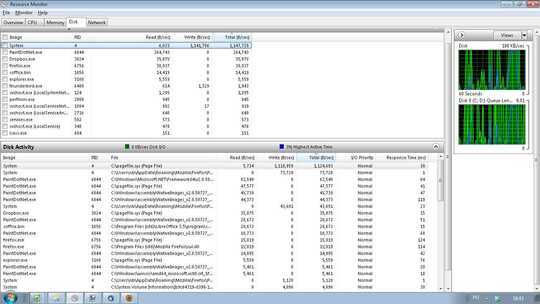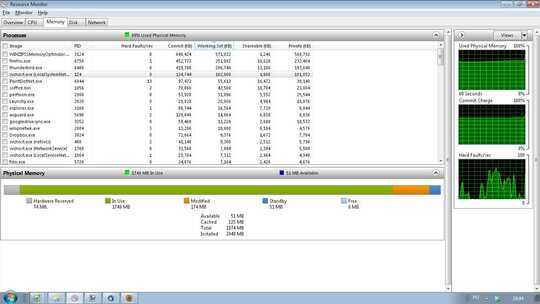35
5
I have a Lenovo g560 3-4 years old, Intel i5, with 2GB ram and with a Geforce 310M. It always had some issues during startup or when starting a new program, but recently it just went crazy.
From the 2GB I always have 300-800 Mbs free, and the cached memory rarely goes above 300 (from 1.9gb maximum), the cpu performance is great (barely reaches 40 percent). Even like this, when I start or even just swap the screen to another bigger program the change of the windows becomes really slow and gradual (e.g. I see the 'pop-up' visual effect, but have to wait for the new windows, which appears only very gradually, first the edge of the frames, then other parts etc). At the same time the mouse cursor's movement is fine (but not the context-dependent changes), and I also got immediate response for the alt+tab combo (that is, the popup window with the opened applications). The lagging also stops sometimes when the program has already loaded in the window.
My suspicion would be that the hard drive causes the whole thing, because its led works a lot, and the laptop had always a considerable degree of lag when I had to manage files or start programs (especially compared to their 'loaded' speed). On the other hand, however, the resource manager does not really show too much disk usage (or I just do not see it)
I ran Winzip Utilites to optimize the computer (malware/junk search, disk defragmentation, driver updates, registry clean-up) but It made things even worse. I think the reason for this was that it turned on the Aero theme. When I changed it back to basic (after the Windows noticed the slowness and asked about that) it did some help, now it is 'just' slow.
Some resource monitor screenshot during lagging:


Have you checked the S.M.A.R.T data on the hdd yet? The reason your computer is slow is because your using 88% of your physical system memory. Try starting your machine with nothing except the required programs to boot see if that helps. – Ramhound – 2013-06-13T16:37:01.967
1at this point 2GB is pretty minimal, and 300MB free is for all intents and purposes "used up", but yes, I would look at your hard disk SMART, chkdsk, and fragmentation. – Frank Thomas – 2013-06-13T16:37:41.963
28You need more RAM. Look at how small the cache is (less than 15% of memory) and how much I/O you're doing to the page file. (Get rid of the memory optimizer. It's worse than useless.) – David Schwartz – 2013-06-13T17:38:05.257
12Note that technically, you have NO free memory: in the screencaps, you are using 100% of the total installed physical memory. The memory optimizer is using 1/4 of the total as well: optimized for inneficiency. – horatio – 2013-06-13T20:09:18.733
Are you using a 32 or 64 bit version of Windows? If you are using 64 bit OS for the first time, it may surprise you to know that you need twice the amount of RAM for comparable speeds. I would be surprised if a 64 bit version of Windows 7 even booted on only 2GB of RAM. – Jesse Webb – 2013-06-13T23:04:32.850
I'd say it was exciting inheriting a computer at work with 48 gigs on it but I come home to 8 gigs and so far am not noticing a huge difference. – Erik Reppen – 2013-06-14T01:13:48.520
As other users pointed, the first thing to do upgrade the RAM to at least 4Gb, by the way.. how much disk space left you have? most of the times windows slowness is related to low disk space available in the computer – spacebiker – 2013-06-14T04:35:43.543
2A computer with considerable free memory can be slow precisely because the OS is huffing and puffing to evacuate pages so that it has free memory. – Kaz – 2013-06-14T05:19:59.177
@JesseWebb then I would like to surprise you: it not only boots, but works with some apps having 2GB of RAM – Andrey Regentov – 2013-06-14T09:41:10.567
1Everyone here just seems to look at the Memory. Maybe your real problem is your graphics card - can you check that it's still alive and you don't run on software graphics? That would explain why your windows draw slowly, for example when you switch windows, but would have nothing to do with CPU, RAM or hard disk. – kutschkem – 2013-06-14T10:46:01.747
1Haven't you seen those "Click here to speed up your computer" links all over the internet? Just click one of those. :) – Joel – 2013-06-14T20:48:32.037
Careful @Joel - some people might think you are being sarcastic! – kwah – 2013-06-14T22:03:29.173